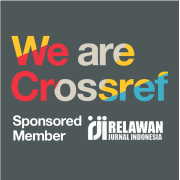PENGUNGKAPAN PEMANFAATAN DANA CORPORATE SOCIAL RESPONSIBILITY UNTUK PENCAPAIAN MAQASHID SYARIAH PADA PT. PLN PERSERO
Abstract
Research on disclosure of Corporate Social Responsibility (CSR) in relation to Maqashid Sharia in State-Owned Enterprises (BUMN) is still rarely conducted, even though the contribution of BUMN has been felt by the community for its benefits and Maslahah. This research aims to describe disclosure of the use of corporate CSR funds in achieving Maqashid Syariah. The research method uses qualitative and descriptive approaches. The technique of data collection are interviews, observation, and literature study. The data validity was done by triangulation. This research uses CSR program data in 2018. The results show that PT. PLN Persero uses CSR Funds contibuted to the achievement of Maqashid Syariah. CSR funds are allocated for five aspects of Maqashid Syariah, namely: protecting religion (hifdz inen), protecting life (hifdz nafs), protecting intelligence (hifdz aql), protecting children (hifdz nasl), and protecting property (hifdz maal). Based on this disclosure, the use of CSR funds for the achievement of the largest Sharia Maqashid is allocated for the aspect of protection of offspring (hifdz nasl). The allocation of CSR funds is IDR 34,168,729,546, or 26.93%. Meanwhile, the smallest amount of funds in the aspect of religious protection (hifdz in) is Rp. 18,046,879,497 or 14.22%. From this research, new insights are obtained about the contribution of CSR Funds to the achievement of Maqashi Syariah. Therefore, further research is needed to measure the effect of CSR funds on the achievement of Maqashid Syariah using other methods. In addition, further research can add data over several years and add the number of objects to several other state-owned companies.
Keywords
Full Text:
PDFReferences
Agusta, I. (2003). Qualitative Data Collection and Analysis Techniques. Pusat Penelitian Sosial Ekonomi. Litbang Pertanian, Bogor, 27 Pebruari 2003, 1–11.
Arsad, S., Ahmad, R., Nazjmi, W., Fisol, M., Said, R., & Haji-othman, Y. (2015). Maqasid Shariah in Corporate Social Responsibility of Shari’ah Compliant Companies. Research Journal of Finance and Accounting, 6(6), 239–248.
Atmadja, A. T. (2013). Methodology and Qualitative Research Struggles in the Domain of Accounting. Jurnal Akuntansi Profesi, 3(2), 122–141. https://doi.org/http://dx.doi.org/10.23887/jap.v3i2
Bahri, E. S., Aslam, M. M. M., Hasan, A. A. H., & Wibowo, H. (2019). Maqasid al-Shariah in Micro-Entrepreneurs Development: an Overview. International Conference of Zakat 2019, 258–267. https://doi.org/10.37706/iconz.2019.182
Bastiar, Y., & Bahri, E. S. (2019). Model Pengkuran Kinerja Lembaga Zakat di Indonesia. ZISWAF : Jurnal Zakat Dan Wakaf, 6(1), 43. https://doi.org/10.21043/ziswaf.v1i1.5609
Čavalić, A. (2018). Corporate Social Responsibility in Islam. 6th International Conference on Islam and Liberty, November, 14–15.
Creswell, J. W. (2014). Research Design: Qualitative, Quantitative, and Mixed Method. In Research Design Qualitative, Quantitative, and Mixed Methods Approaches. SAGE Publications, Inc.
Dermawan, D., & Deitiana, T. (2014). Factors that influence Corporate Social Responsibility Disclosure. Jurnal Bisnis Dan Akuntansi, 16(2), 158–165. https://doi.org/https://doi.org/10.34208/jba.v16i2.86
Finarti, A., & Putra, P. (2015). Implementation of Maqashid Al-Syariáh on the Implementation of Islamic Bank CSR: Case Study at PT. BRI Syariah Bank. SHARE, 4(1), 37–66. https://doi.org/http://dx.doi.org/10.22373/share.v4i1.724
Hadi, A. C. (2016). Corporate Social Responsibility and Corporate Zakat in Islamic Economic Law Perspective. Jurnal Ilmu Syariah, 16(2), 229–240. https://doi.org/DOI: 10.15408/ajis.v16i2.4453
Hadi, K. (2012). Implementation of Maqashid Syariah as an Indicator of Islamic Companies. Jurnal Al-Azhar Indonesia Seri Pranata Sosial, 1(3), 140–150.
Hadi, N. (2011). Interaction of Social Responsibility, Social Performance, Financial Performance, and Extent of Social Disclosure (Test the Motive Behind Corporate Social Responsibility Going public in Indonesia). MAKSIMUM, 1(2), 59–67. https://doi.org/10.26714/mki.v1i2.247
Hussein, A. (2009). The use of Triangulation in Social Sciences Research: Can qualitative and quantitative methods be combined? Journal of Comparative Social Work, 1–12. https://doi.org/https://doi.org/10.31265/jcsw.v4i1.48
Kamil, A., & Herusetya, A. (2012). Effect of Company Characteristics on the Disclosure of Corporate Social Responsibility Activities. Media Riset Akuntansi, 2(1), 1–17.
Kara, M. (2012). Al-Syatibi’s Thoughts on Maslahah and Its Implementation in Sharia Economic Development. Jurnal Assets, 2(2), 173–184.
Kriyantono, R. (2015). Public Relations and Corporate Social Responsibility in Mandatory Approach Era in Indonesia. Procedia - Social and Behavioral Sciences, 211(September), 320–327. https://doi.org/10.1016/j.sbspro.2015.11.041
Kusumo, J. M. T., & Juniarti. (2015). Pengaruh Corporate Social Reponsibility Terhadap Respon Investor Dalam Sektor Industri Barang Konsumsi. Business Accounting Review, 3(1), 212–222.
Maqbool, S., & Zameer, M. N. (2018). Corporate social responsibility and financial performance: An empirical analysis of Indian banks. Future Business Journal, 4(1), 84–93. https://doi.org/10.1016/j.fbj.2017.12.002
Marnelly, T. R. (2012). Corporate Social Responsibility (CSR): Tinjauan Teori dan Praktek di Indonesia. Jurnal Aplikasi Bisnis, 2(2), 49–59.
Masoud, N. (2017). How to win the battle of ideas in corporate social responsibility : the International Pyramid Model of CSR. Masoud International Journal of Corporate Social Responsibility, 2(4). https://doi.org/10.1186/s40991-017-0015-y
Mihriban, C. A., & Harun, K. (2017). The Corporate Sustainability Solution: Triple Bottom Line. The Journal of Accounting and Finance, July, 18–34.
Mitra, N., & Schmidpeter, R. (2020). Mandated Corporate Social Responsibility: Evidence from India. Springer. https://doi.org/10.1007/978-3-030-24444-6 ©
Nayenggita, G. B., Raharjo, S. T., & Resnawaty, R. (2019). Praktik Corporate Social Responsibility (CSR) di Indonesia. Jurnal Pekerjaan Sosial, 2(1), 61–66. https://doi.org/https://doi.org/10.24198/focus.v2i1.23119
Nugroho, L., Utami, W., Sanusi, Z. M., & Setiyawati, H. (2018). Corporate Culture and Financial Risk Management in Islamic Social Enterprises (Indonesia Evidence). International Journal of Commerce and Finance, 4(2), 12–24.
Purwanto, A. (2011). Effect of Industry Type, Company Size, Profitability on Corporate Social Responsibility. Jurnal Akuntansi & Auditing, 8(1), 12–29. https://doi.org/https://doi.org/10.14710/jaa.8.1.12-29
Putri, A. K., Sudarma, M., & Purnomosidhi, B. (2016). Effect of Corporate Social Responsibility on Company Value with Company Size and Number of Board of Commissioners as Moderating Variables (Study of Manufacturing Companies listed on the Indonesia Stock Exchange). Jurnal Aplikasi Manajemen (JAM), 14(2). https://doi.org/http://dx.doi.org/10. 18202/ jam23026332.14.2.16
Putri, R. A., & Christiawan, Y. J. (2014). Pengaruh Profitabilitas, Likuiditas, dan Leverage terhadap Pengungkapan Corporate Social Responsibility (Studi pada Perusahaan-Perusahaan yang Mendapat Penghargaa ISRA dan Listed (Go-Publik) di Bursa Efek Indonesia (BEI) 2010-2012). Business Accounting Review, 2(1), 61–70.
Saifi, M. (2020). Corporate Social Responsibility Manufaturing Company in Indonesia. Journal of Applied Management (JAM), 18(2), 383–390. https://doi.org/http://dx.doi.org/10. 21776/ub.jam.2020.018.02.19
Salman, S. (2014). Ethics & Governance (Issue July). Chartered Islamic Finance Professional (CIFP) INCEIF – The Global University of Islamic.
Schurink, W. J. (2003). Qualitative Research In Management And Organisational Studies With Reference To Recent South African Research. SA Journal of Human Resource Management, 1(3), 2–14. https://doi.org/10.4102/sajhrm.v1i3.25
Syafii, M., Sanrego, Y. D., & Taufiq, M. (2012). An Analysis of Islamic Banking Performance : Maqashid Index Implementation in Indonesia and Jordania. Journal of Islamic Finance, 1(1), 12–29.
Tarique1, K. M., Ahmed, M. U., Hossain, D. M., & Momen, M. A. (2017). Maqasid al-Shariah in CSR Practices of the Islamic Banks: A Case Study of IBBL. Journal of Islamic Economics, Banking and Finance, 13(3), 47–63.
Türker, D. (2015). Contrasting Instrumental Views on Corporate Social Responsibility: Short-term Versus Long-term Profit Orientation Approach. Procedia - Social and Behavioral Sciences, 207, 568–576. https://doi.org/10.1016/j.sbspro.2015.10.128
Wuttichindanon, S. (2017). Kasetsart Journal of Social Sciences Corporate social responsibility disclosure d choices of report and its determinants: Empirical evidence from fi rms listed on the Stock Exchange of Thailand. Kasetsart Journal of Social Sciences, 38(2), 156–162. https://doi.org/10.1016/j.kjss.2016.07.002
DOI: http://dx.doi.org/10.31958/imara.v4i2.2242
Refbacks
- There are currently no refbacks.
Copyright (c) 2020 Efri Syamsul Bahri, Efri Syamsul Bahri

This work is licensed under a Creative Commons Attribution-ShareAlike 4.0 International License.
INDEX BY:
Journal Imara distribute under a Creative Commons Attribution-NonCommercial 4.0 International License


















